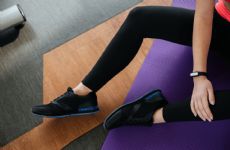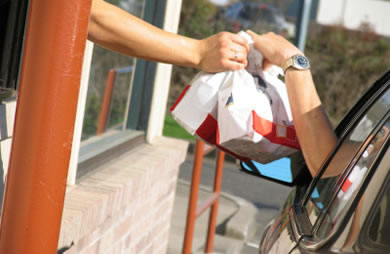|
The foundation for a successful workout is laid well before breaking a sweat. Half the battle is the prep, which is why fitness experts recommend setting out all your clothes and gear ahead of time. You’re much more likely to make it to an early spin class if you have everything set out the night before, and trading happy hour for power hour is much easier when your gym bag is already packed and waiting for you in the car after work. Speaking of gym bags: What’s in yours? It’s important to have the essentials on hand when you need them, but you don’t want to be schlepping around a bunch of unnecessary junk all day long. Of course, depending on your workout of choice, your definition of “must-have” might be different than your workout buddy’s or cubicle mate’s, but there are some basics—aside from the obvious fresh change of clothes—that warrant a permanent spot in your fitness satchel. 1. Stainless steel water bottleWhether you’re hitting the treadmill, taking a boot camp class or pumping iron on the weight floor, proper hydration before, during and after your workout is essential to staying energized and performing at your best. “Hydration not only lubricates your joints, but it also provides an energy boost and improves digestion, keeping you motivated and feeling good before, during and after your workouts,” personal trainer and group fitness instructor Ashley Pitt explains. 2. Healthy snacks and/or recovery barWhen heading to a workout at the end of your shift, it’s probably been at least a few hours since lunch. “Unless you're doing fasted cardio for fat loss purposes, you can usually expect to perform better in your workouts when you've had something to eat beforehand to provide you with sustained energy,” Pitt says. She recommends keeping something small in your gym bag to munch on—such as fruit, nuts or veggies with hummus—about 45 to 60 minutes before exercising. While it’s always best to refuel with real food after a workout, a recovery bar can be a good backup for those inevitable instances when you forget or are running short on time. “Keeping a couple of bars in your bag that contain plenty of protein and carbs can save you in a pinch if you or a friend is in need,” notes running coach Kyle Kranz. Not sure which bar is best? Registered dietitians recommend watching the added sugar (aim for fewer than 20 grams) and choosing bars with about 200 to 320 calories, 10 to 25 grams of protein and 20 to 40 grams of carbohydrates. Another option for post-workout recovery is chocolate milk. Competitive runner Jason Karp published a study on its recovery benefits. According to the results, “Chocolate milk naturally provides many of the same electrolytes that are added to commercial recovery drinks (calcium, potassium, sodium and magnesium) along with fluids to help you rehydrate. Plus, it has the right 3:1 carb-to-protein ratio scientifically shown to replenish muscle glycogen (muscle fuel) quickly.” 3. Personal hygiene itemsIf you’re heading straight to work after a morning gym session, your colleagues will certainly appreciate you freshening up beforehand. If you don’t have the time or facilities to take a full shower, stock your bag with cleansing wipes, deodorant and dry shampoo. It’s also a good idea to throw in a fresh microfiber towel as an alternative to gym-provided towels. 4. Bluetooth headphonesA high-energy playlist is a surefire way to kick your motivation into high gear, but headphone cords can be annoying or even dangerous. Fitness trainer Dani Singer always brings along Bluetooth headphones, which connect wirelessly to Bluetooth-enabled smartphones so you can listen to your favorite music without a cord getting in the way. “It’s not just for fun—research studies have shown that when individuals listen to their music of choice, their workout performance tends to improve,” Singer says. “Invest in a good pair of Bluetooth headphones—if there’s one place you’ll hate dealing with wires, it’s on the gym floor.” 5. Gym-specific shoesInstead of wearing your workout shoes to the gym, Kranz suggests keeping them in your bag and changing when you arrive. “The gym will appreciate this because it prevents you from wearing dirty shoes into the facility, and you'll never have to show up to the gym and realize you didn't grab your trainers,” he says. This is also a must-have if you’re heading straight to the gym from work—there’s nothing worse than arriving for spin class or a treadmill session and realizing you’ve only got a pair of dress shoes with you. 6. Lacrosse ballStarting a workout with warm, loose muscles helps to maximize performance and prevent injury. Pitt suggests keeping a lacrosse ball in your gym bag to stretch out before exercising. “Lacrosse balls have many uses for massaging, releasing tension and turning on your proprioception for better workouts,” she says. Pitt puts a lacrosse ball under her bare feet, stands up and rolls it from heel to toe. "You'll find that you walk taller and feel better all over your lower half just from giving yourself a foot massage, which gets the blood flowing up the legs.” If you're unfamiliar with self-myofascial release, consider setting up an appointment with a personal trainer to get tips on effective methods before trying it on your own. 7. Resistance bandFor those times when it’s crowded at the gym and you can’t get a machine—or if you decide to do a non-gym workout instead—fitness trainer Jill Brown suggests packing a flat loop resistance band, which is practically weightless and takes up virtually no room in the bag. “You can break out the band and do a variety of exercises, like squats, kick-backs, clamshells and crab walks,” she notes. 8. Hand sanitizerEven well-maintained gyms can be a breeding ground for germs, so be sure to stick some hand sanitizer in your bag so you can clean your hands after using shared equipment, such as dumbbells or weight machines. |
Popular EntriesRelated Entries
More From SparkPeople
|



















.jpg)


